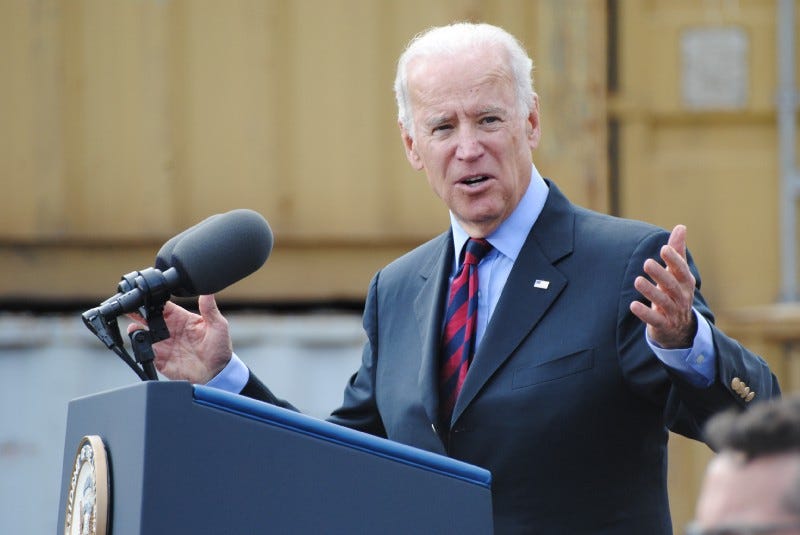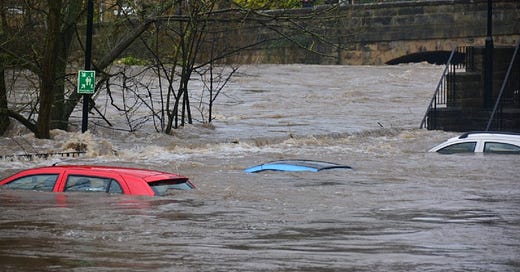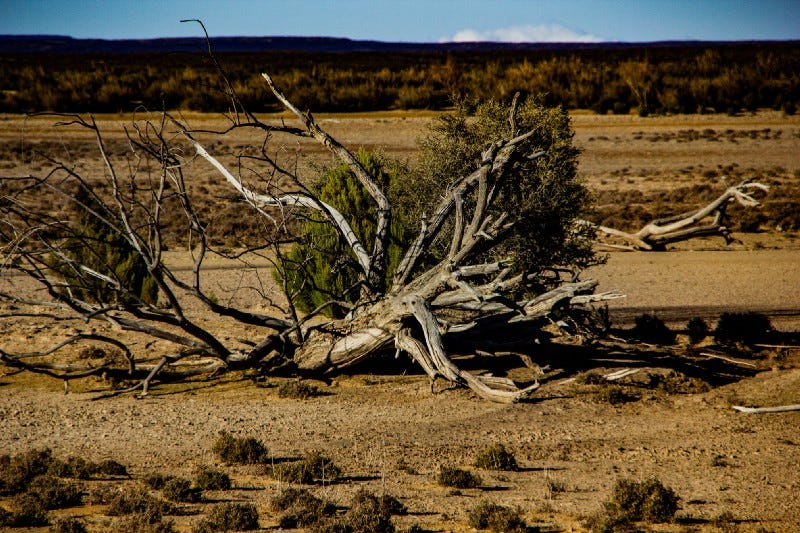Biden scores another infrastructure win (for now)
Seventeen Republican senators joined 50 Democrats voting in favor of a $1 trillion bipartisan deal.
Welcome to Planet Week, where we highlight the last week of environmental news and what it means for our Planet.
Last week, water shortages sparked protests in Iran, Olympians continued to battle record heat, and Big Oil recorded big profits.
In case you missed it, here’s what else happened around the Planet:
Sunday, July 25
Floods sweep across Europe, the Middle East
Heavy rains hit London last week, flooding train stations and streets and highlighting how even the Planet’s richest cities are subject to climate impacts, writes CNN. The floods come after a recent study found that slow-moving storms in Europe could become 14 times more common by 2100.
And in Afghanistan, a flash flood killed at least 80 people and destroyed 200 homes in the Taliban-controlled village in the Nuristan Province, reports The New York Times. Afghanistan is one of the Planet’s most climate-vulnerable countries, according to the World Bank.
Monday, July 26
Expect more record-breaking heat
The recent heatwave over the Pacific Northwest and British Columbia may soon be our new normal, according to a new study. That study, published Monday in Nature Climate Change, found that climate change will likely drive record heatwaves in the coming decades.
The more emissions we pump into the atmosphere, the more likely these record-shattering heatwaves will occur, the study found. But if we cut our emissions drastically, we may be able to avoid many of these scenarios. Either way, these recent heat extremes are no longer an anomaly.
“The take-home message of our study is that it really is no longer enough to just look at past records or past measurements of weather,” Erich Fischer, lead author of the study, told ABC News. “We need to prepare for something different.”
Tuesday, July 27
Western lakes are drying up
A decades-long megadrought is becoming a problem for 40 million Westerners who rely on crucial reservoirs for water. Two of the U.S.’s largest reservoirs, Lake Powell and Lake Mead, just hit record lows. This reality could lead to drops in hydropower, as well as stricter water restrictions, reports The New York Times.
Utah’s Great Salt Lake is also drying up — last weekend, the lake dropped to its lowest levels ever recorded, as more than 99% of the state faces extreme drought conditions, NBC News reports.
Biden’s mileage rule
Biden didn’t only promise to revamp the country’s infrastructure, he also pledged to halve emissions by 2030. And last week, his administration took its first steps toward this goal.
The proposal would restore Obama-era vehicle standards, rolled back under former President Trump, and nudge 40% of U.S. drivers into electric cars by the end of the decade. But environmental groups don’t think these proposed rules go far enough.
“The world isn’t the same as it was in 2012 when President Obama signed the clean car standards,” Katherine Garcia, acting director of Sierra Club’s Clean Transportation for All campaign, told The Associated Press. “Millions of Americans have had to swelter in heat waves, evacuate their homes in the face of onrushing wildfires, or bail out flooded homes.”
In related moves, Biden began dismantling a Trump-era rollback of wastewater restrictions from coal plants.

Wednesday, July 28
Biden scores another infrastructure win (for now)
The Biden administration scored a big win on its infrastructure plan. Seventeen Republican senators joined 50 Democrats voting in favor of a $1 trillion bipartisan deal, which would include $550 in new spending.
Some climate provisions made it into the deal, including $73 billion for grid investments, $39 billion for public transit, and $7.5 billion for electric vehicle charging stations (Axios summarizes the climate spending). That’s far short of Biden’s initial climate goals, but a separate $3.5 trillion infrastructure bill passed along party lines could close that gap, The New York Times points out.
“Neither side got everything they wanted in this deal,” Biden said in a statement. “But that’s what it means to compromise and forge consensus — the heart of democracy.”
The bill will now go to the House and Senate to be debated on, with politicians from both parties hashing out the details of what makes it into a potential law.
Western wildfires rage on
Oregon’s Bootleg fire, the United States’ largest wildfire, is burning through forests that companies are using as carbon offsets, according to analyses by CarbonPlan. That reality is compounding the climate impacts of the fire, explains Oriana Chegwidden, a climate scientist at CarbonPlan.
“So now, if you start thinking about forest offset projects as areas that might burn, that means they’re also sources of emissions,” she told Earther.
It’s gotten so bad that President Biden met last week with seven governors to determine how the federal government can assist Western states. In related news, ecologists sat down with NPR to discuss the links between climate change and the West’s severe fire season.
Friday, July 30
Deadly wildfires rage across Turkey, Spain
California isn’t the only region with raging wildfires — Europe is also facing increasingly severe blazes. Turkey is fighting more than 50 fires, with the heat intensity of the fires four times higher than ever recorded, reports The Guardian. The fires have killed four people and forced thousands of evacuations.
In Spain, firefighters are battling a wildfire that has consumed over 3,000 acres, reports The Associated Press. The hot weather, combined with strong winds, has fueled the fire, which is 60 miles west of Barcelona. Both incidents serve as reminders of the impacts of a warmer Planet.
Bonus
Knights in spiny armor
Corals around the world are in trouble, and even natural stressors — like grazing sea snails — are pushing entire reefs to the brink. But scientists down in Florida are trying to see if introducing spotted spiny lobsters, a predator of sea snails, can save the day.
“Restoration practitioners often try to remove as many of these snails at restoration sites when they can,” Casey Butler, a researcher with the Fish and Wildlife Research Institute, told EcoWatch. “But the aim of this current project is to harness the marine food web by employing lobsters that will eat those corallivorous snails and keep the snail populations, and thus the mortality of the coral outplants, at bay.”
Have a great week,
Brandon and Sam







